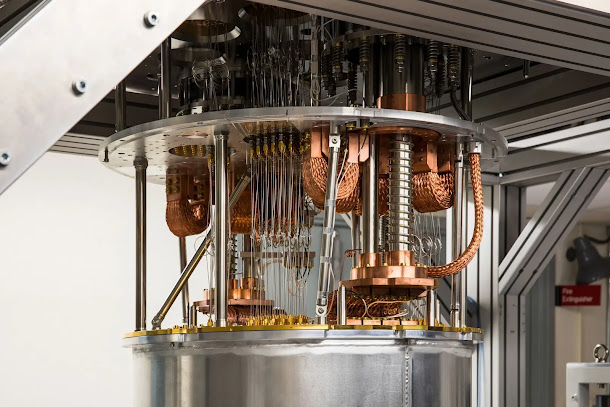''' QUANTUM LEAP
QUADRANT '''
THE MODERN COMPUTING ERA BEGAN in the 1930s, with the work of Alan Turing, but it wasn't until the 1980s that the famously eccentric Nobel Laureate Richard Feynman began kicking around questions like :
What would happen if we built a computer that operated under quantum rules instead of classical ones? Could it be done? And if so how? More important, would there be any point?
FOR YEARS ASTRONOMERS BELIEVED THAT the coldest place in the universe is a massive gas cloud 5,000 light-years from Earth called the Boomerang Nebula, where the temperatures hover around -272 Degrees C, just a whisker above absolute zero.
But as it turns out, the scientists have been off by about 5,000 light-years. The coldest place in the universe is actually in a small city directly east of Vancouver called Burnaby.
Burnaby is the headquarters of a computer firm called D.Wave, Its flagship product, the D-Wave Two, of which there are five in existence, is a black box 3m high. Inside is a cylindrical cooling apparatus containing niobium computer chip that's been chilled to around 20 millikelvins -
Which, in case you're not used to measuring temperature in millikelvins, is about -273.1 degrees C, almost 1 degree colder than the Boomerang Nebula. By comparison, interstellar space is about 80 times hotter.
THE D-WAVE TWO is an unusual computer, and D-Wave is an unusual company. It's small, just 114 people, and its location puts it well outside the swim of Silicon Valley.
But its investors include the storied Menlo Park, Calif, venture-capital firm Draper Fisher Jurvetson, which founded Skype and Tesla Motors.
It's also backed by famously prescient Amazon founder Jeff Bezos and an outfit called In-Q-Tel, better known as the high-tech investment arm of the CIA.
Likewise, D-Wave has very few customers, but they're blue chip : they include the defense contractor Lockheed Martin; a computing lab that's hosted by NASA and largely funded by Google; and a U.S. intelligence agency that D-Wave executives decline to name.
The reason D-Wave has so few customers is that it makes a new type of computer called a quantum computer, that's so radical and strange, people are still trying to figure out what it's for and how to use it.
It could represent an enormous new source of computing power - it has the potential to solve problems that would take conventional computers centuries, with revolutionary consequences for fields ranging from cryptography to nanotechnology, pharmaceuticals to artificial intelligence.
That's the theory, anyway. Some critics, many of them Ph.D.s and significant academic reputations, think D-Wave's machines aren't quantum computers at all.
But D-Wave's customers buy them anyway, for around $10 million a pop, because if they're the real deal they could be the biggest leap forward since the invention of the microprocessor.
IN A SENSE, QUANTUM COMPUTING REPRESENTS the marriage of two of the great scientific undertakings of the 20th century, quantum physics and digital computing. Quantum physics arose from the shortcomings of classical physics :
Although it had stood for centuries as definitive, by the turn of the 20th century it was painfully apparent that there are physical phenomena that classical physics fails dismally to explain.
So brilliant physicists - including Max Planck and Albert Einstein - began working on a new set of rules to cover the exceptions, specifically to describe the action of subatomic particles like photons and electrons.
Those rules turned out to be very odd. They included principles like superposition, according to which a quantum system can be in more than one state at the same time and even more than one place at the same time.
Uncertainty is another one : the more precisely we know the position of a particle, the less precisely we know how fast it's traveling - we can't know both at the same time. Einstein ultimately found quantum mechanics so monstrously counterintuitive that he rejected it as either wrong or profoundly incomplete.
As he famously put it : '' I can't believe that God plays dice with the world.''
The Honour and Serving of the Latest Global Operational Research on Quantum Computing, History and the Future implications, continues. The World Students Society thanks author Lev Grossmann.
With most respectful dedication to the Global Founder Framers of !WOW!, and then Students, Professors and Teachers of the World. See You all prepare for Great Global Elections on The World Students Society : wssciw.blogspot.com and Twitter X !E-WOW! - The Ecosystem 2011 :
Good Night and God Bless
SAM Daily Times - the Voice of the Voiceless

.png)


0 comments:
Post a Comment
Grace A Comment!